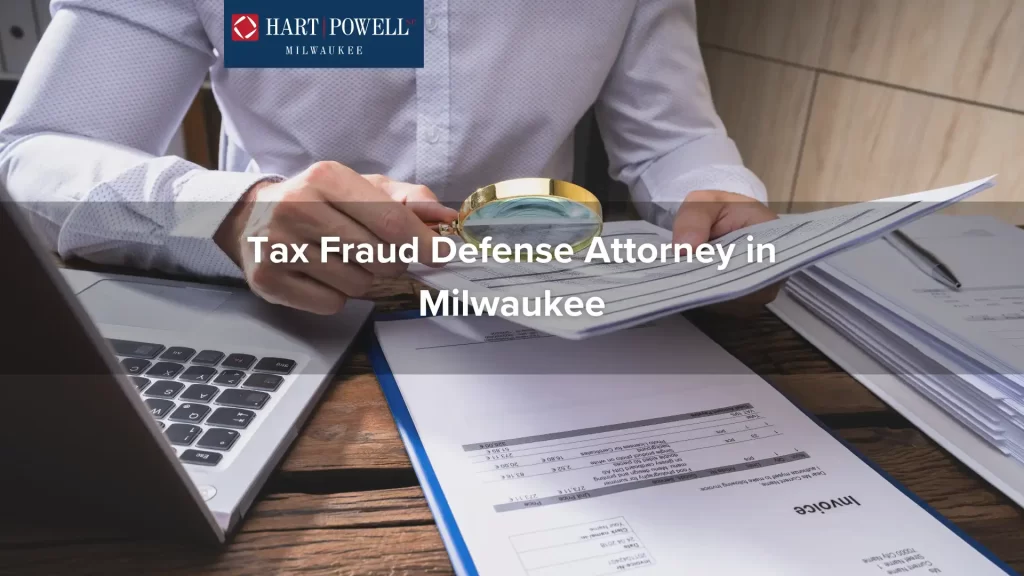
Tax fraud is the crime of intentionally misrepresenting your finances to the federal government in order to pay less in taxes than what is owed. If the government discovers tax fraud, it can take steps to investigate and prosecute the crime. The Internal Revenue Service is the government body charged with collecting taxes from the public and finding people who are trying to defraud the system.
If you are being charged with tax fraud, you are not alone. The dedicated Milwaukee tax fraud lawyers of Hart Powell, S.C. have the experience and knowledge to handle these allegations. Contact us at (414) 271-9595 to discuss your defense today.
Why Choose Hart Powell, S.C. for My Tax Fraud Case?
Hart Powell, S.C. has almost thirty years of experience defending our clients from charges of all kinds, state or federal. We have the knowledge and compassion to see past an arrest or criminal charge and help you fight for justice. We understand that criminal charges affect not only you but also your family, your job, and your reputation. We will work hard to get to know you and the specific details of your case so that we can build a credible defense and vigorously defend you in court.
Do I Need a Tax Fraud Attorney?
If you’ve been charged with tax fraud by the IRS, you may have a rough journey ahead. Though you can certainly represent yourself in a case against the IRS, you may be a legal team of one fighting against a team of dozens in court. Having an experienced attorney on your side makes all the difference in building a comprehensive legal defense. Federal and state tax laws can be complex, and successfully navigating the legal framework is only possible with a lawyer that has the knowledge and foresight to protect their client from unjust prosecution.
What is Tax Fraud?
Tax fraud is when an individual or business knowingly underpays or fails to pay their tax obligations. Tax fraud can be prosecuted at the state or federal level and is usually initiated when the Internal Revenue Service discovers irregularities in tax statements from a person or business. Charges of tax fraud can be civil or criminal in nature.
The Internal Revenue Service, part of the Federal Department of the Treasury, is responsible for both collecting taxes and seeking out and investigating instances of tax fraud. The IRS employs thousands of agents whose sole job is to thoroughly investigate suspected tax fraud charges and search for cases worthy of prosecution. As well as seeking out individuals guilty of tax fraud, the IRS looks for businesses or groups engaged in these practices so they can level charges of conspiracy to commit tax fraud as well as prosecute the individual cases in civil or criminal court.
Common Tax Violations
There are numerous mistakes a person might make when filing their taxes. Complicated bureaucratic paperwork and mathematics make it difficult to understand exactly what is going on when you are calculating what is owed. Some commonly made mistakes include:
- Underreporting income
- Over-reporting deductions
- Omitting assets
These mistakes are easy to make, but they could result in tax fraud accusations against you. Because the consequences of tax fraud conviction can be harsh, it is important to do everything you can to avoid this situation. Talk to a lawyer today if you have been accused of tax fraud.
Penalties for Tax Fraud
Penalties for convictions of tax fraud vary depending on the circumstances surrounding the fraud and whether the charges are criminal or civil in nature. Criminal penalties can include jail time and monetary fines, whereas civil penalties usually include monetary damages and the repayment of any lost funds or prosecutorial expenses.
Penalties for tax fraud include the following:
- Tax evasion. A conviction of tax evasion carries a fine of up to $100,000 for individuals and $500,000 for businesses, and up to five years in federal prison.
- Conspiracy. Penalties for conspiracy to commit tax fraud vary greatly depending on the nature and size of the conspiracy and the amount of money defrauded, but charges of conspiracy can be in addition to charges for any individual tax crimes.
- False statements on tax returns. A conviction of making false statements on a federal tax form carries a penalty of up to 3 years in prison and a fine of up to $100,000 for individuals and $500,000 for businesses.
- Assisting or aiding in preparing false tax statements. A conviction of assisting another party in completing false tax statements carries a penalty of up to three years in federal prison and a fine of up to $100,000 for individuals, as well as repaying any prosecution costs to the IRS.
IRS agents may choose to levy one or more of these charges on any individual or business they find might be committing fraud, with subsequent fines and jail time stacking up for each charge.
Possible Defenses for Tax Fraud
 Building a comprehensive legal defense for charges of tax fraud takes time and expertise. The exact defense will vary depending on the nature of the charges, whether they are criminal or civil, and whether they are for an individual or business.
Building a comprehensive legal defense for charges of tax fraud takes time and expertise. The exact defense will vary depending on the nature of the charges, whether they are criminal or civil, and whether they are for an individual or business.
Some possible defenses for tax fraud include:
- Voluntary disclosure. A defense based on voluntary disclosure means approaching the IRS and advising them that you may have committed tax fraud and paying a monetary fine. In many cases, a voluntary disclosure defense will result in the IRS foregoing prosecution.
- Lack of willful fraud. This defense focuses on the fact that people make mistakes on their taxes and may not be knowingly committing fraud. If you can prove that you meant to pay the full amount due on your taxes, the IRS cannot prosecute you.
- Advice of counsel. This defense applies to individuals that used a third party to prepare their taxes and that party either intentionally or unintentionally misreported income or assets, implicating you in the fraud.
- Statute of limitations. The IRS has a limited time to file charges of tax fraud or evasion. If they allow that time limit to lapse, they cannot prosecute you for tax fraud even if they have sufficient evidence for a conviction. The Wisconsin statute of limitations for tax fraud is six years from the discovery of the fraud.
- Insufficient evidence. To convict a party of tax fraud, the IRS must have and display evidence that shows beyond a reasonable doubt that you intended to defraud the government of taxes. If they’re unable to provide material evidence, you can avoid a conviction.
How Much Does a Tax Fraud Attorney Cost?
What you’re charged by a tax fraud defense attorney for representing you depends greatly on the charges against you and the specifics of your case. Generally, criminal charges will incur higher costs than civil charges, though that isn’t true all the time. To get a better idea of what your defense will cost, call Hart Powell, S.C. to discuss your case with our tax fraud defense team.
Contact Us
If you are currently facing tax fraud charges or other white collar crime accusations, you will want the experienced Milwaukee fraud defense lawyers of Hart Powell, S.C. on your side. They can potentially have your charges reduced or even dismissed altogether. Call us at (414) 271-9595 to learn more about your legal options.
